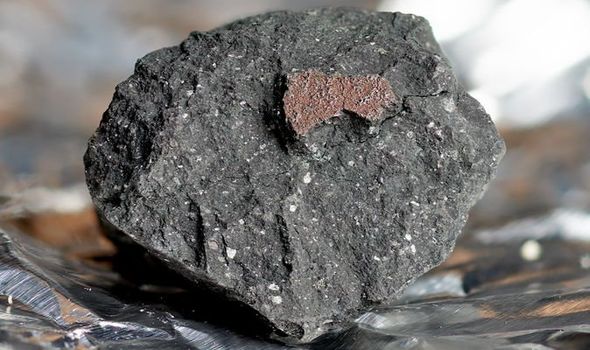Radars pinged on Saturday afternoon when a small meteor or bolide entered the skies over the Bristol Channel. The space rock startled the residents of Devon, Dorset and Somerset at about 3pm when it triggered a loud sonic boom that rattled window panes. Scientists speculate fragments of the meteor may have survived the descent and landed somewhere in the three counties.
If you heard the sonic boom or caught a glimpse of the meteor, you can report your sighting on the UK Meteor Network website.
UKFall tweeted: “Somewhere in Devon, Dorset or Somerset a black rock fell out of the sky yesterday.
“Likely to be glossy black with thumbprint-sized depression.
“NOT like tarmac or furnace slag. Not white, not blue, it’s black. Did you find it?”
If any fragments are recovered, it will mark the second time in less than a month that a small rock has landed in England.
The previous meteorite was found after a short search effort in a driveway in the Cotswolds and was a very rare type known as a carbonaceous chondrite.
Scientists dubbed the discovery a dream come true, believing will help us learn more about the earliest days of the solar system.
Cuba was graced by its own meteor when a bright fireball exploded in the night skies last Friday.
Yesterday’s meteor was also spotted from the north of France, thanks to clear skies over the country.
UKFall said: “UK clouds were below the horizon when viewed from France.”
The sightings have led to some speculation by the UK Meteor Network the object landed in the sea.
UKFall, however, remained positive the fragments touched down on land while stressing the need for more public observations and reports to verify these events.
The group tweeted: “That’s not reliable. Not enough observations from side-on.
“So it could still be over the Bristol Channel and not be inconsistent with this. Also not consistent with #sonicboom”
People across England and Wales flooded social media yesterday with reports, video clips and pictures of the meteor.
Steve Jones tweeted from Wales: “Just seen a meteorite or similar shoot past Abercastle towards Mathry, Pembry – bright white ball with an iridescent tail (metallic green and white) – very fast. No, I haven’t been drinking…”
Another person said: “Wow, it could have been a meteor then? Strangest sound I’ve ever heard, (apart from free form jazz, obvs)”
About a hundred tonnes of debris and space dust bombard the planet every single day but our atmosphere protects us from all but the biggest objects.
Astronomers at the US space agency NASA estimate any rock up to 82ft (25m) across will disintegrate before reaching the ground.
Smaller pieces do occasionally touch down and the shockwaves caused by bigger meteors exploding in the air can be devastating.
When a 65ft-wide (20m) rock exploded over Russia’s Chelyabinsk Oblast in 2013, the shockwave blew out windows in a large radius and injured more than 1,000 people with shards of glass.






